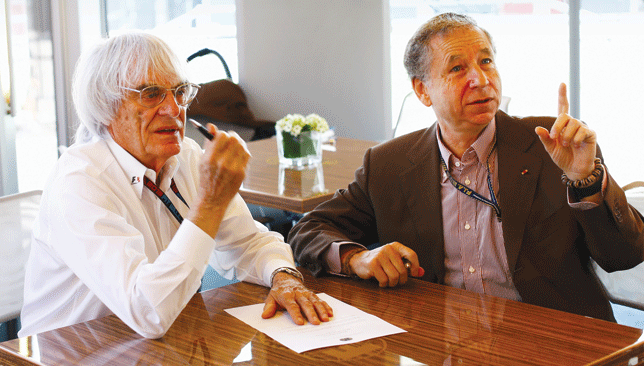
Formula One’s big hitters have promised their smaller rivals they will not smash them out of the ballpark when it comes to next week’s crucial talks surrounding the sport’s financial future.
Following confirmation earlier this month from FIA president Jean Todt that his plans for a cost cap from next year had been abandoned, four teams – Force India, Sauber, Caterham and Marussia – penned a strongly-worded letter to the Frenchman expressing their outrage.
F1’s Strategy Group – comprising Ferrari, McLaren, Mercedes, Red Bull, Williams and Lotus – had previously voted for a cap, only to have second thoughts and decide against.
The small teams, however, are desperate for new financial measures to be put in place to curb escalating costs and ensure they can continue to compete.
Without directly threatening legal action, the letter cited European competition law, suggesting an abuse of power by the bigger teams, as well as what they saw as an erosion of governance within the sport.
The upshot is a meeting between all 11 teams, Todt and F1 supremo Bernie Ecclestone that is to take place on May 1 in the hope a way forward can be found.
Red Bull team principal Christian Horner insists the smaller teams will not be ignored.
“Absolutely not because at the end of the day we have to have somebody to race against,” said Horner.
“The purpose and formation of the Strategy Group means there are teams in there who are in the same situation as Force India for example, or worse.
“You’ve got Lotus, whose situation has been fairly dire for the last couple of years, and Williams, who are run on a tight budget. They have key representation in the Strategy Group, so gauging their opinion is fairly important, so there is a balanced view in that discussion.”
Horner, who has long been against a cap as he believes it would be impossible to correctly police, believes the only way for teams to save money is through the sporting and technical regulations.
Horner added: “The cost cap, at the level that was being discussed, was so far beyond the means of the smaller teams anyway.
“It was almost a 100 per cent increase on the budgets some of them are operating on. How would that help them in any way shape or form? The far more effective way, which is something I’ve believed in from the beginning, is controlling costs by the sporting regulations because that has the biggest impact on your cost drivers.
“If, as a group, we focus on those elements then we can really save significant costs for all the teams, the little and big teams.”
Mercedes motorsport boss Toto Wolff has revealed he was initially in favour of a cost cap, and although ultimately he had to revise his opinion, feels there is another solution.
“We realised some of the other big teams could not follow that path, with Ferrari a good example as they have everything – the road car business and F1 – in one entity, and it’s difficult for them to have everything screened,” said Wolff.
“It doesn’t make sense to go against two or three of the big teams. We’re working to find the best solution, we’re getting together in a few days, and we will try to implement what we can.
“What we are (looking) for is a ceiling, so we are not running away in a spending war with the other teams, and for a glide path downwards so we can reduce the gap between the larger and smaller teams.”
McLaren racing director Eric Boullier has sided with Horner on the inability to police a cost cap.
The Frenchman said: “There is no way you can influence something you know is going to be difficult to control.”